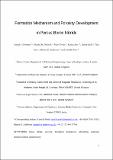Formation mechanism and porosity development in porous boron nitride
Abstract
Porous boron nitride (BN) has proven promising as a novel class of inorganic materials in the field of separations and particularly adsorption. Owing to its high surface area and thermal stability, porous BN has been researched for CO2 capture and water cleaning, for instance. However, research remains at the laboratory scale due to a lack of understanding of the formation mechanism of porous BN, which is largely a “black box” and prevents scale up. Partial reaction pathways have been unveiled, but they omit critical steps in the formation, including the porosity development, which is key to adsorption. To unlock the potential of porous BN at a larger scale, we have investigated its formation from the perspective of both chemical formation and porosity development. We have characterized reaction intermediates obtained at different temperatures with a range of analytical and spectroscopic tools. Using these analyses, we propose a mechanism highlighting the key stages of BN formation, including intermediates and gaseous species formed in the process. We identified the crucial formation of nonporous carbon nitride to form porous BN with release of porogens, such as CO2. This work paves the way for the use of porous BN at an industrial level for gas and liquid separations.
Citation
L'Hermitte , A , Dawson , D M , Ferrer , P , Roy , K , Held , G , Tian , T , Ashbrook , S E & Petit , C 2021 , ' Formation mechanism and porosity development in porous boron nitride ' , Journal of Physical Chemistry C , vol. Articles ASAP . https://doi.org/10.1021/acs.jpcc.1c08565
Publication
Journal of Physical Chemistry C
Status
Peer reviewed
ISSN
1932-7447Type
Journal article
Description
This work was carried out with the support of Diamond Light Source, instrument B07 (proposal SI-26588). We acknowledge the funding from bp-ICAM and the funding from the Engineering and Physical Sciences Research Council (EPSRC) through the CDT in Advanced Characterisation of Materials (2018 NPIF grant EP/S515085/1).Collections
Items in the St Andrews Research Repository are protected by copyright, with all rights reserved, unless otherwise indicated.

